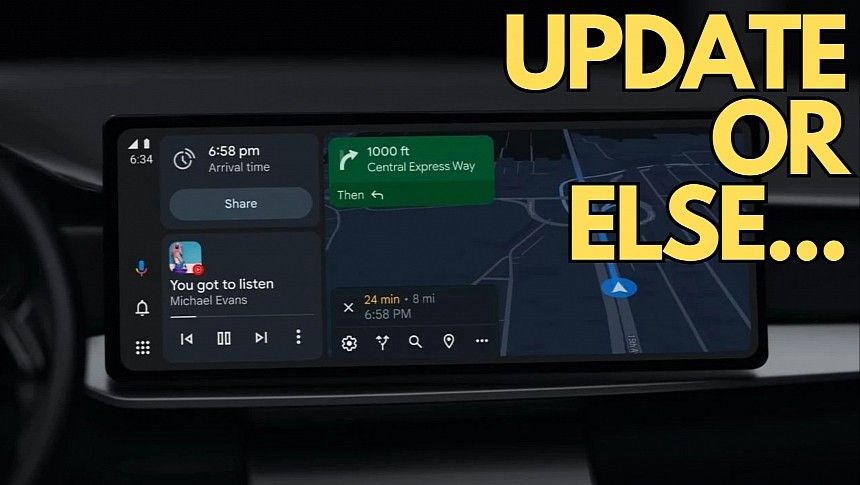Google is gearing up for a change that could make it impossible for some users to run Android Auto on their devices.
The company could soon update the Android Auto system requirements, forcing users to update their mobile devices to a newer version of Android or stop using the app.
The current system requirements for Android Auto include an Android phone with Android 8.0 (also known as Oreo) for the wired version. Users who want to run Android Auto without a cable need Android 9.0 if they own a Samsung Galaxy S8, S8+, or Note 8, Android 10 with any Google or Samsung phone, or Android 11 for any other device.
Any Android version newer than the ones mentioned above works correctly with wired or wireless connections.
However, the latest Android Auto builds include references for a prompt that Google could soon display when detecting an older version of Android. "To keep using Android auto, update your phone to the latest version of Android," the message will read.
The recent discovery in Android Auto 11 suggests that Google could update the system requirements for the app, dropping support for the oldest OS versions that are still supported.
Some speculate that Google could leave behind Android Nougat (version 7.0), especially because other Google apps, such as Google Calendar and Google Chrome, have already announced the end of support dates for this version of the operating system.
However, Android Auto doesn't support Android Nougat anyway, as the minimum requirement to run the app with a cable is Oreo. It's unclear if Google wants to drop support for Oreo, but that's rather unlikely – I wouldn't be surprised to see this happening, though, as Oreo is already an old operating system that landed more than six years ago; the final release went live two years ago.
Google might be aiming for a different approach with this message and possibly require users to update to the latest Android version IF their mobile device supports it. An old Android smartphone running Oreo might not be able to handle a newer operating system version, but if it does, Google could require an update specifically to provide the user with an improved experience with the app.
The update prompt is still in the early phases for now, and it's not yet live in Android Auto 11, so it could take a while until we finally get more information about Google's plans. However, the search giant might be cooking something on this front, so if your phone supports a newer Android version, maybe it's time to start considering an update.
You might want to stay away from Android 14, though, as the new operating system doesn't seem to play nice with Android Auto, regardless of the device you own.
The current system requirements for Android Auto include an Android phone with Android 8.0 (also known as Oreo) for the wired version. Users who want to run Android Auto without a cable need Android 9.0 if they own a Samsung Galaxy S8, S8+, or Note 8, Android 10 with any Google or Samsung phone, or Android 11 for any other device.
Any Android version newer than the ones mentioned above works correctly with wired or wireless connections.
However, the latest Android Auto builds include references for a prompt that Google could soon display when detecting an older version of Android. "To keep using Android auto, update your phone to the latest version of Android," the message will read.
The recent discovery in Android Auto 11 suggests that Google could update the system requirements for the app, dropping support for the oldest OS versions that are still supported.
Some speculate that Google could leave behind Android Nougat (version 7.0), especially because other Google apps, such as Google Calendar and Google Chrome, have already announced the end of support dates for this version of the operating system.
However, Android Auto doesn't support Android Nougat anyway, as the minimum requirement to run the app with a cable is Oreo. It's unclear if Google wants to drop support for Oreo, but that's rather unlikely – I wouldn't be surprised to see this happening, though, as Oreo is already an old operating system that landed more than six years ago; the final release went live two years ago.
Google might be aiming for a different approach with this message and possibly require users to update to the latest Android version IF their mobile device supports it. An old Android smartphone running Oreo might not be able to handle a newer operating system version, but if it does, Google could require an update specifically to provide the user with an improved experience with the app.
The update prompt is still in the early phases for now, and it's not yet live in Android Auto 11, so it could take a while until we finally get more information about Google's plans. However, the search giant might be cooking something on this front, so if your phone supports a newer Android version, maybe it's time to start considering an update.
You might want to stay away from Android 14, though, as the new operating system doesn't seem to play nice with Android Auto, regardless of the device you own.















